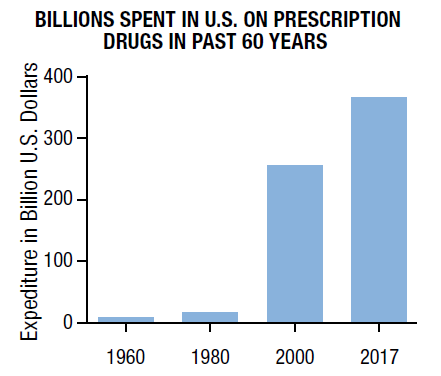The Administration announced a plan to hold pharmaceutical companies accountable for their skyrocketing prices. This proposal would have finally required Big Pharma to reveal the sticker price of their pills in TV commercials if the drug cost more than $35.
Hopefully, the plan would shame drug makers into lowering their outrageous prices.
And I’m sure it had them quaking in their boots.
Unfortunately, a federal judge shot down the plan — saying it violated Big Pharma’s free speech rights.
To me, it’s just more of the same…
Especially when it comes to curing the most urgent public health crisis of our lifetime — Syndrome Zero. As a regular reader, you know that this condition is at the root of almost every chronic disease we face today. Including obesity, heart disease, cancer, Alzheimer’s, arthritis, high blood pressure and diabetes.
But Big Pharma’s dangerous drugs are not the answer. In fact, Big Pharma with the help of their partners in the FDA, have already made trillions of dollars from Syndrome Zero.
Yet their drugs have failed to prevent or cure a single chronic disease.
For example:

✔ Type 2 diabetes has increased a jaw-dropping 1,750% in the last 30 years.
✔ Heart disease remains the country’s No. 1 killer.
✔ Alzheimer’s rates have exploded over the past few decades.
You can’t rely on Big Pharma or the FDA to protect your health — they’re only in it for themselves.
At the Sears Institute for Anti-Aging Medicine, we have developed a protocol to treat Syndrome Zero — without any of Big Pharma’s meds. You see, all modern chronic diseases have the same root. So it only makes sense to start there — instead of simply treating symptoms.
The first step to defeating Syndrome Zero is a strategy Big Medicine doesn’t get — because
it doesn’t come in the shape of a pill. Instead, it’s entirely based on nutrition and the effect of insulin on your body.One of the best ways to start attacking Syndrome Zero is to drastically reduce the amount of insulin-spiking starches you eat. Starches should not make up more than 5% to 10% of your calorie intake. Start by avoiding all processed foods, as well as grains, rice, pasta, beans and starchy vegetables like potatoes that grow underground.
Healthy fats should make up 70% of your calories. Grass-fed beef, organ meats, eggs and other proteins make up the remaining 20% to 25%.
Kick Big Pharma’s Insulin Drugs to the Curb
Sometimes you need more help than a healthy meal plan to get runaway blood sugar back in balance. But that doesn’t mean you need Big Pharma’s meds. Here’s what I recommend instead to bring insulin levels under control:
- Supplement with the “weed” that heals. The FDA calls purslane a pervasive weed. But studies prove it is just as effective as Big Pharma drugs for treating diabetes.
Purslane mimics the action of insulin, improving glucose uptake in insulin-resistant cells before it can lead to high blood sugar levels.
In one study, diabetics who took 180 mg of purslane extract increased insulin sensitivity and glucose uptake into their cells. They also improved their hemoglobin A1C by an average of 44%.1
I recommend supplementing with 500 mg a day.
- Add in some goldenseal. A Chinese study of 84 patients with out-of-control insulin levels found that the herb berberine lowered blood sugar levels just as well as the drug metformin. It also significantly cut HbA1c levels.2
Goldenseal is sometimes sold under the names “Berberine” or “Oregon Grape.” I recommend taking one 500 mg capsule two to three times a day with food.
- Then follow up with American ginseng. For hundreds of years, American ginseng (Panax quinquefolius) was used to treat high blood sugar. And a brand-new study backs this up.3 Researchers found that compared to a placebo, ginseng significantly reduced A1C and fasting blood glucose.
But the benefits didn’t stop there… American ginseng also lowered blood pressure while increasing good HDL cholesterol.
I recommend supplementing with 200 mg daily. And be sure to take it within two hours of a meal.
To Your Good Health,
Al Sears, MD, CNS
1. Wainstein J, et al. “Purslane extract and glucose homeostasis in adults with type 2 diabetes: A double-blind, placebo-controlled clinical trial of efficacy and safety.” J Med Food. 2016;19(2):133-140.
2. Yang J, et al. “Berberine improves insulin sensitivity by inhibiting fat store and adjusting adipokines profile in human preadipocytes and metabolic syndrome patients.” Evid Based Complement Alternat Med. 2012;2012:363845.
3. Vuksan V, et al. “Efficacy and safety of American ginseng (Panax quinquefolius L.) extract on glycemic control and cardiovascular risk factors in individuals with type 2 diabetes: A double-blind, randomized, cross-over clinical trial.” Eur J Nutr. 2019;58(3):1237-1245.
